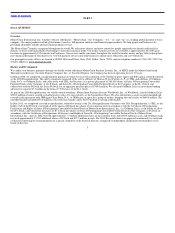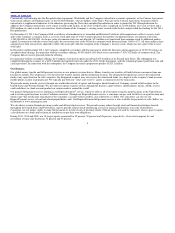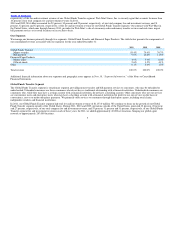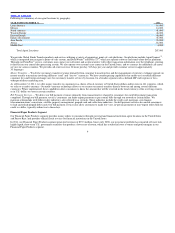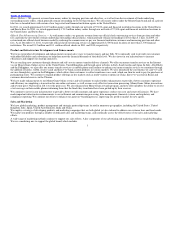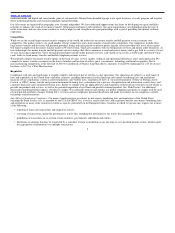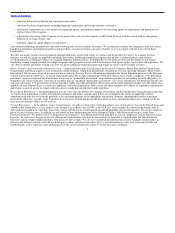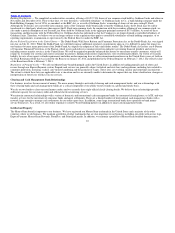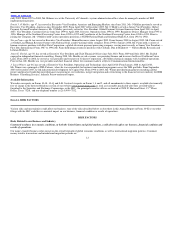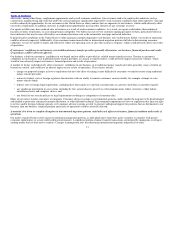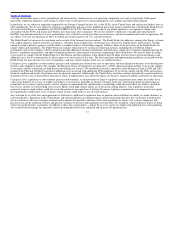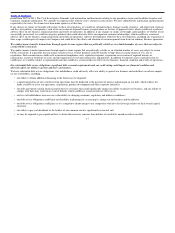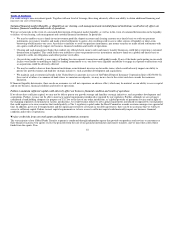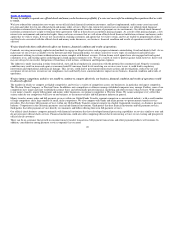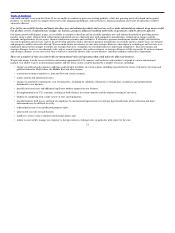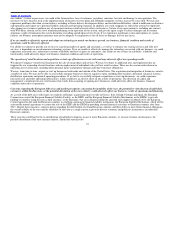MoneyGram 2011 Annual Report Download - page 14
Download and view the complete annual report
Please find page 14 of the 2011 MoneyGram annual report below. You can navigate through the pages in the report by either clicking on the pages listed below, or by using the keyword search tool below to find specific information within the annual report.
Table of Contents
affected by, among other things, employment opportunities and overall economic conditions. Our customers tend to be employed in industries such as
construction, manufacturing and retail that tend to be cyclical and more significantly impacted by weak economic conditions than other industries. This may
result in reduced job opportunities for our customers in the United States or other countries that are important to our business, which could adversely affect
our results of operations. In addition, increases in employment opportunities may lag other elements of any economic recovery.
Our agents or billers may have reduced sales or business as a result of weak economic conditions. As a result, our agents could reduce their number of
locations or hours of operation, or cease doing business altogether. Our billers may have fewer customers making payments to them, particularly billers in
those industries that may be more affected by an economic downturn such as the automobile, mortgage and retail industries.
If general market conditions in the United States or other national economies important to our business were to deteriorate further, our results of operations
could be adversely impacted. Additionally, if our consumer transactions decline or international migration patterns shift due to deteriorating economic
conditions, we may be unable to timely and effectively reduce our operating costs or take other actions in response, which could adversely affect our results
of operations.
If consumers’ confidence in our business or in traditional money transfer providers generally deteriorates, our business, financial position and results
of operations could be adversely affected.
Our business is built on consumers’ confidence in our brands and our ability to provide fast, reliable money transfer services. Erosion in consumers’
confidence in our business, or in traditional money transfer providers as a means to transfer money, could adversely impact transaction volumes, which
would in turn adversely impact our business, financial position and results of operations.
A number of factors could adversely affect consumers’ confidence in our business, or in traditional money transfer providers generally, many of which are
beyond our control, and could have an adverse impact on our results of operations. These factors include:
• changes or proposed changes in laws or regulations that have the effect of making it more difficult for consumers to transfer money using traditional
money transfer providers;
• actions by federal, state or foreign regulators that interfere with our ability to transfer consumers’ money reliably, for example, attempts to seize
money transfer funds;
• federal, state or foreign legal requirements, including those that require us to provide consumer data to a greater extent than is currently required;
• any significant interruption in our systems, including by fire, natural disaster, power loss, telecommunications failure, terrorism, vendor failure,
unauthorized entry and computer viruses; and
• any breach of our security policies or legal requirements resulting in a compromise of consumer data.
Many of our money transfer consumers are migrants. Consumer advocacy groups or governmental agencies could consider the migrants to be disadvantaged
and entitled to protection, enhanced consumer disclosure, or other different treatment. If governments implement new laws or regulations that limit our right
to set fees and/or foreign exchange spreads, or if consumer advocacy groups are able to generate widespread support for positions that are detrimental to our
business, then our business, financial position and results of operations could be adversely affected.
A material slow down or complete disruption in international migration patterns could adversely affect our business, financial condition and results of
operations.
Our money transfer business relies in part on international migration patterns, as individuals move from their native countries to countries with greater
economic opportunities or a more stable political environment. A significant portion of money transfer transactions are initiated by immigrants or refugees
sending money back to their native countries. Changes in immigration laws that discourage international migration and political or other
13


